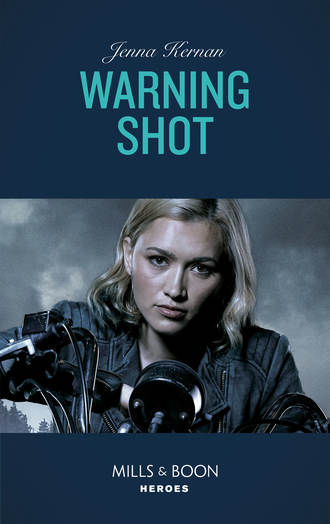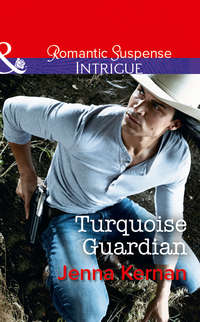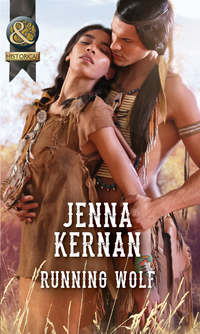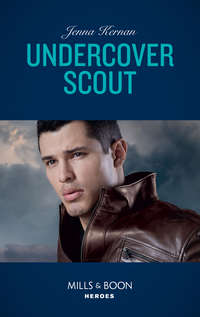
Полная версия
Warning Shot
“Josh and Noah, you two have point,” said Vasta, instructing the men to lead the escort.
Both men rose, grinning. Each wore tight-fitting uniforms. Josh’s hair was black and bristly short. Noah wore his brown hair in a knot at his neck.
They headed out behind the officers, with Axel holding Hockings’s taut arm as if she were his prisoner. Behind them came the acting chief of police. Trace tried and failed not to notice that he could nearly encircle Rylee’s bicep with his thumb and index finger and that included her wool coat. She glared up at him and her muscle bunched beneath his grip. Hockings clearly did not like role-play.
The crowd that Hockings had insisted Vasta question were now calling rude suggestions and booing. Vasta waved and spoke to them in Kowa, a form of the Iroquoian language. The officers before them peeled away, giving Axel a view of his cruiser and the rear door. For reasons he did not completely understand, his squad car was untouched. Axel hit the fob, unlocking his unit. Noah swept the rear door open.
Axel made a show of putting his hand on Hockings’s head to see that she was safely ensconced in the rear of his unit. The effect brought a cheer from the peanut gallery and allowed him to get the answer to one of his many questions about Hockings.
Her hair was soft as the ear of an Irish setter and blond right to the roots. Hockings fell to her side across the rear seat and remained on her side. Wise beyond her years, he thought.
The booing resumed as he climbed behind the wheel. It pleased him that Josh and Noah now stood between his unit and the gathering of pissed-off Mohawks.
And off they went. They were outside of Salmon River, the tribe’s main settlement, but still on rez land before Rylee sat up and laced her fingers through the mesh guard that separated his front from the back seat. Her fingernails were shiny with clearish pink polish and neatly filed into appealing ovals. Her wrists were no longer secured.
“How did you get out of that?” he asked.
“My father says you can measure a person’s IQ by whether or not they carry a pocketknife.”
“With the exception being at airports?” he asked.
“You going to keep me back here the entire way?”
“Not if you want to sit beside me.”
She didn’t answer that, just threw herself back into the upholstery and growled. Then she looked out the side window.
“They better not damage my car,” she muttered.
“More,” he said.
“What?”
She wasn’t looking at him. He knew because he was staring at her in the rearview until the grooves in the shoulder’s pavement vibrated his attention back to the road.
“Damage your car more,” he clarified. “They already shot at it. So, you find who you were looking for?”
She folded her arms over her chest. Just below her lovely small breasts, angry fists balled. She was throwing so much shade the cab went dark.
“How do you know I was looking for someone?”
“What Home Security does, isn’t it, here on the border?”
“In this case, yes. We have an illegal crossing and the suspect fled onto Kowa lands.”
“They have your suspect?”
“Denied any knowledge.”
Homeland Security Agent Rylee Hockings was about as welcome in Salmon River as a spring snowstorm.
“Maybe Border Patrol has your guy.”
“No. They lost ’em. That’s why they called me. They abandoned pursuit when our suspect crossed onto Mohawk land. Both the suspect and the cargo have vanished.” She glanced back the way they had come. “I need my car.”
What she needed were social skills. She didn’t want his help, but she might need it. And he needed to get her out of his county before she got into something way more dangerous than ruffled Mohawk regalia. Up here on the border, waving a badge at the wrong people could get you killed.
The woman might have federal authority and a mission, but she didn’t know his county or the people here. Folks who lived on the border did it for one of three reasons. Either it was as far away from whatever trouble they had left as they could get, or they had business on the other side. He’d survived up here by knowing the difference, doing his job and not poking his nose into the issues that were not under his purview.
There was one other reason to be up here. If you had no other choice. Rylee had a choice. So she needed to go. Sooner was better.
He considered himself to be both brave and smart, but that would be little to no protection from Rylee’s alluring brown eyes and watermelon-pink mouth. Best way he knew to keep clear of her was to get her south as soon as possible.
“The Mohawk are required to report illegal entry onto US soil,” she said. “And detain if possible. They did neither.”
“Maybe they aren’t interested in our business or our borders.”
“America’s business? Is that what you mean?”
He scratched the side of his head and realized he needed a haircut. “It’s just my experience that the Mohawk people consider themselves separate from the United States and Canada.” He half turned to look back at her. “You know they have territory in both countries.”
“Yes, I was briefed. And smuggling, human trafficking and dope running happen in your county.”
She’d left out moonshining. But border security was thankfully not his job. Neither were the vices that were handled by ATF—the federal agency responsible for alcohol, tobacco, firearms and recently explosives. He was glad because enforcement was a dangerous, impossible and thankless assignment. His responsibilities, answering calls from citizens via EMS, traffic stops and accidents made up the bulk of his duties. He was occasionally involved with federal authorities, collaborating only when asked, and Agent Hockings seemed thrilled to do everything herself. He should leave it at that.
“Borders bring their own unique troubles.”
“Yet, you have made limited arrests related to these activities. Mostly minor ones, at that, despite the uptick in illegal activities, especially in winter when the river freezes.”
He ignored the jibe. He did his duty and that was enough to let him sleep most nights.
“It doesn’t always freeze,” he said.
“Hmm? What doesn’t?”
“The river. Some years it doesn’t freeze.”
She cocked her head and gave him a look as if he puzzled her. “How long have you been sheriff?”
If she were any kind of an agent, she knew that already, but he answered anyway.
“Going on six years this January.”
“You seem young.”
“Old enough to know better and halfway to collecting social security.”
“You grew up here, didn’t you?”
“I’ve never lived anywhere else.”
“You have family up here?”
His smile faltered, and he swerved to the shoulder. He gripped the wheel with more force than necessary and glanced back at her, his teeth snapping together with a click.
One thing he was not doing was speaking about his past. Not his time in the military, not the men he’d killed or the ones he couldn’t save. And he wasn’t ever speaking of the time before the sheriff got him clear of the compound. He needed to get this question machine out of his county, so he could go back to being the well-respected public servant again.
As far as he knew, only two men knew where he came from—his father and the former sheriff. And he looked nothing like that scrawny kid Sheriff Rogers had saved. So changed, in fact, he believed his own father would not know him. At least that was what he prayed for, every damn day. All he wanted in this world was to live in a place where the rules made sense, where he had some control. And where, maybe someday, he and a nice, normal woman could create a family that didn’t make his stomach knot. But for now, he needed to be here, watching his father. Here to stop him if he switched from preaching his unhinged religious vision to creating it.
She opened her copper-flecked brown eyes even wider, feigning a look of innocence.
“What?” she asked.
He unlocked his teeth, grinding them, and then pivoted in his seat to stare back at her.
“Two hours ago, you showed up in the city of Kinsley at city hall, making it very clear that you did not want the assistance of the county sheriff. Now you want my résumé.”
“Local law enforcement is obliged to assist in federal investigations.”
“Which I will do. But you asked about my family. Like to fill in some blanks, that right? Something before I turned thirteen?” She was digging for the details that were not in public records or, perhaps, just filling time. Either way, he was not acting as the ant under her magnifying glass.
She met his stare and did not flinch or look away from the venom that must have been clear in his expression. Instead, she shrugged. “What I want is out of this back seat.”
He threw open his door and then yanked open hers. She stared up at him with a contrite expression that did not match the gleam of victory shimmering in the dark waters of her eyes. Dangerous waters, he thought. Even through his annoyance, he could not completely squelch the visceral ache caused by her proximity.
“You prefer to drive?” he said.
She slipped out of his vehicle to stand on the road before him. “Not this time. When do I get my vehicle back?”
He drew out his phone and sent a text. By the time she had settled into the passenger side, adjusted both the seat and safety belt, he received a reply.
“It’s there now,” he said. The photo appeared a moment later and he plastered his hand across his mouth to keep her from seeing his grin. Axel slipped behind the wheel and performed an illegal turn on a double solid, a privilege of his position, and took them back the way they had come.
“Why are you whistling?” she asked.
Was he? Perhaps. It was just that such moments of glee were hard to contain. By the time they reached the sign indicating the border of the Mohawk rez, she caught sight of her vehicle.
Someone had poured red paint over the roof and it was dripping down over both the windows and doors on one side. There were handprints all over the front side panel.
“My car!” she cried, leaning forward for a good look. Then she pointed. “That’s damaging federal property.”
“Looks like a war horse,” he said, admiring the paint job. It was so rare that people got exactly what they deserved.
Chapter Three
Rylee Hockings stood beside the surly sheriff with hands on hips as she regarded the gooey paint oozing from the metallic door panel of her official vehicle and onto the road. She struggled to keep her chin up. Her first field assignment had headed south the minute she headed north. When her boss, Lieutenant Catherine Ohr, saw this car, she would be livid.
Her vehicle had been towed and left just outside the reservation land and abandoned beneath the sign welcoming visitors to the Kowa Nation.
“Maybe the paint will fill in the bullet holes,” offered Sheriff Trace.
His chuckle vibrated through her like a call issued into an empty cave. Something about the tenor and pitch made her stomach do a funny little tremble. She rested a hand flat against her abdomen to discourage her body from getting ideas.
“I could use those prints as evidence,” she said to Sheriff Trace.
“Or you could accept the life lesson that you might be the big cheese where you come from but to the Kowa, you are an outsider. Up here, your position will get you more trouble than respect. Which is why I offered you an escort.”
And she had turned him down flat. Despite his mirthful blue eyes, extremely handsome face, brown hair bleached blond from what she presumed was the summer sun, and a body that was in exceptionally good shape, something about this man rubbed her the wrong way. The sheriff seemed to think the entire county belonged to him personally.
“I need to call Border Patrol.” She left him to gloat and made her call. Border Patrol had lost their suspects after they entered Mohawk territory yesterday, Sunday, at three in the afternoon and had had no further sightings. Now she understood why they ceased pursuit at their border of the reservation and called her field office. They had set up a perimeter, so the suspect was either still on Mohawk land or had slipped off and into the general population. The chances that this man was her man were slim, but until she had word that the package and courier had been apprehended elsewhere, she would treat each illegal border crossing as if the carrier came from Siming’s Army.
Her conversation and update yielded nothing further. The perimeter remained in place. All vehicles entering or leaving the American side of the Kowa lands were being checked. They had not found their man.
She stowed her phone and returned the few steps to find her escort watching the clouds as if he had not a thing to do.
“They tell you they wouldn’t go on Mohawk land?” he asked.
She didn’t answer his question, for he seemed to already know their reply. “So, anyone who wants to avoid apprehension from federal authorities just has to make it onto Mohawk land as if they had reached some home-free base, like in tag.”
“No, they have to reach Mohawk’s sovereign land and the Mohawk have to be willing to allow them to stay. The Kowa people have rights granted to them under treaties signed by our government.”
They had reached another impasse. Silence stretched, and she noticed that his eyes were really a stunning blue-gray.
“You want me to hang around?” he asked, his body language signaling his wish to leave.
“Escort me to a place that can get this paint off,” she said.
He touched the paint and then rubbed it between thumb and forefinger. He wiped his finger and thumb on the hood, then tapped his finger up and down to add his fingerprints to the others.
“Stop that!”
He did, holding up his paint-stained hand in surrender. “Oil based. Can’t use the car wash. Body shop, I suppose.”
“You have one?”
“Not personally, but there is one in town.”
“I’ll follow.” She used her fob to open the door and nothing happened.
He lowered his chin and lifted his brows. The corners of his mouth lifted before he twisted his lips in a poorly veiled attempt to hide his smile.
Had the vandals disconnected her battery or helped themselves to the entire thing?
“Tow truck,” he said.
She faced the reservation sign, lifted a stone from the road and threw it. The rock made a satisfying thwack against the metal surface.
He placed the call and she checked in with her office. No messages.
“Tow truck will be here in twenty minutes. Want to wait or grab a ride with me?”
“What do I do with the keys?”
“Tow truck doesn’t need those,” he said.
She nodded. “I knew that.”
Did she sound as green as she felt? How much more experience in the field did Trace have? He’d been an army MP and now was a sheriff.
“How did you decide to run for sheriff?” she asked.
His mouth tipped downward. He didn’t seem fond of speaking about his past. She decided to find out why that was. She’d missed something in her hasty check.
“My friend and mentor, Kurt Rogers, was retiring. He held on until I got out of the service and threw his support behind me. Been reelected once since then.”
Rylee managed to retrieve her briefcase and suitcase from the trunk, half surprised to see them there and not covered with paint. They walked back to his sheriff’s unit side by side.
“Must be hard to be popular in this sort of work.”
He cocked his head. “I don’t find it so.”
He helped her place her luggage in the rear seat and then held the passenger door for her. She had her belt clipped as they pulled back on the highway.
They did not speak on the ride into town. The air in the cruiser seemed to hold an invisible charge. She shifted uncomfortably in her seat and he rubbed his neck.
“Motel or the body shop?” he asked as they hit the limits of the town of Kinsley, which was the county seat.
“Motel.”
It bothered her that, of the three possible choices, he took her directly to the place where she was staying. She didn’t ask how he knew.
The sheriff pulled to a stop and she retrieved her bags.
He stood on his side of the vehicle, staring across the roof at her. “You feel like telling me where you’ll be next, or should I just follow the sound of gunfire?”
She refused to take the bait and only thanked him for the lift.
“Don’t mention it,” he said and then added, as he slipped back into his unit, “I surely wouldn’t.”
She stooped to glare at him through the open passenger door. “Why not?”
“You won’t need to. Soon everyone in the county will know you are here and what happened on Mohawk land, because a good story spreads faster than wildfire and because you used exactly the sort of strong-arm tactics I’d expect from a rookie agent. What I can’t figure is why your supervisor sent you up here without a babysitter. You that unpopular he couldn’t even find you a partner? Or is he just that stupid?”
“She is not stupid and it’s an honor to be given a solo assignment,” she said, feeling her face heat. “A show of respect.”
“Is that what she told you?”
She slammed the door and he laughed. Rylee stood, fuming, as he cruised out of the lot.
What did she care what he thought? She had work to do. Important work. And she didn’t need the approval of the sheriff of one of the most sparsely populated counties in the state.
Kowa Mohawk people were on her watch list along with a motorcycle gang calling themselves the North Country Riders. This gang was known to smuggle marijuana across the Canadian border. Additionally, she needed to investigate a family of moonshiners. The Mondellos had for years avoided federal tax on their product by making and distributing liquor. Finally, and most troubling of all, was a survivalist compound headed by Stanley Coopersmith. Their doomsday predictions and arsenal of unknown weapons made them dangerous.
This was Rylee’s first real field assignment and they had sent her solo, which was an honor, no matter what the sheriff said. She was unhappy to be given such an out-of-the-way placement because all the analysis indicated this as the least likely spot for Siming’s Army to use for smuggling. Most of department had moved to the Buffalo and Niagara Falls regions where the analysis believed Siming’s Army would attempt infiltration.
She let herself into her room and went to work on her laptop. She took a break at midafternoon to head out to the mini-mart across the street to buy some drinks and snacks.
Her car arrived from the body shop just after six o’clock, the telltale outline of the red paint still visible along with the outline of three handprints.
“Couldn’t get those out without buffing. Best we could do,” said the gaunt tow truck driver in navy blue coveralls. “Also replaced the battery.”
“Dead?” she asked.
“Gone,” he said.
He clutched a smoldering half-finished cigarette at his side and her invoice in the other. The edges of the brown clipboard upon which her paperwork sat were worn, rounded with age.
She offered her credit card. He copied the numbers and she signed the slip.
The tow truck operator cocked his head to study the vehicle’s new look with watery eyes gone yellow with jaundice. “Almost looks intentional. Like those cave paintings in France. You know?”
Rylee flicked her gaze to the handprints and then back to the driver.
“Like a warrior car. I might try something like it with an airbrush.”
Rylee her held out her hand for the receipt.
“If I were you, I’d stay off Mohawk land. Maybe stick to the casino from now on.”
She accepted the paperwork without comment. The driver folded the pages and handed them to her. Rylee returned to her room and her laptop. It was too late to head out to the next group on her watch list. That would have to wait until tomorrow.
Her phone chimed, alerting her to an incoming call. The screen display read Catherine Ohr, and she groaned. She couldn’t know about the car already.
“Did you not understand the Mohawk are a sovereign nation?” said her boss.
“On federal land.”
“On Kowa Mohawk Nation land. When I asked you to speak to them, I meant you should make an appointment.”
“At eight a.m., Border Patrol notified me of a runner. A single male who crossed the border on foot carrying a large navy blue duffel bag. He was believed to have been dropped off by his courier on the Canadian side. That same courier then picked him up on the US side. They were sighted on River Road. Border Patrol detained the pickup driver thirty minutes later just outside Mohawk lands. The passenger fled on foot onto the reservation, carrying the large duffel on his back.”
“They questioned the driver?”
“Yes. He denies picking anyone up.”
“Name?”
“Quinton Mondello. Oldest son of Hal Mondello.”
“How many sons does he have?”
“Four. Quinton runs things with his father. He’s the heir apparent, in my opinion.”
“So, the moonshiners were carrying moonshine. Made a drop in Canada and were heading home with an empty truck.”
“Then why run?”
“You believe the passenger was an illegal immigrant?”
“At the very least,” said Rylee.
“You believe the Mondello family is engaged in human trafficking?”
“Or they are assisting the Siming terrorist.”
“That’s a stretch. Border Patrol saw the passenger flee?”
Rylee’s stomach knotted. “No. They were acting on an anonymous tip who reported seeing the passenger flee prior to Border Patrol’s arrival. Border Patrol stopped a truck of similar description just outside Mohawk lands.”
“Could have been a Mohawk carrying cigarettes from Canada. Could have been a moonshiner. Pot grower. Poacher. And their tip could have been a rival poacher, moonshiner or pot grower. Any of those individuals would have reason to flee. Hell, they have ginseng hunters up here trespassing all the time.”
“Not in the fall.”
Ohr made a sound like a growl that did not bode well for Rylee’s career advancement plans.
“It could also be a suspect,” added Rylee, pushing her luck.
“Therefore, we don’t really know if there even was a passenger.”
“Quinton Mondello denies carrying a passenger.”
“Of course, he does. And he may be telling the truth.”
Rylee didn’t believe that for a minute.
“So, you decided to follow, alone, without backup and without notifying the tribal police,” said Ohr.
Rylee dropped her gaze to the neatly made bed and swallowed, knowing that speaking now would reveal an unwanted tremor in her voice.
“Hockings?”
“Border Patrol didn’t pursue.” There was that darn tremor.
“Because they understand the law. That is also why they had to release Quinton Mondello. No evidence of wrongdoing.”
Silence stretched.
“Do I need to pull you?”
“No, ma’am.”
“I do not have time to clean up your messes, Hockings.”
Rylee thought of the handprints on her federal vehicle and her head hung in shame.
“Do not go on Mohawk land again for any reason.”
“Yes, ma’am.”
Ohr hung up on her.
Rylee needed some air. She gathered her personal weapon, wallet, shield and keys before heading out. The September night had turned cooler than she realized, and she ducked inside to grab a lined jacket. She stepped outside again and glanced about. The night had fallen like a curtain, so much blacker than her suburban neighborhood with the streetlights lining every road. Here, only the parking lot and the mini-mart across the road glowed against the consuming dark. She’d seen an ice-cream place, the kind that had a grill, on their arrival. A burger and fries with a shake would hit the spot. It wasn’t until she was driving toward her destination that she realized she had snatched the blue windbreaker that had bold white letters across the back, announcing that she was Homeland Security.







